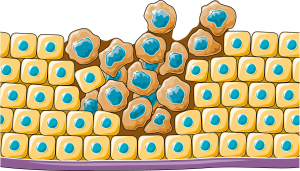Oncology Case Studies
Oncology Case Studies
Oncology is the branch of medicine focused on the prevention, diagnosis, and treatment of cancer; a disease that can affect almost any part of the body.

Cancer develops from the uncontrolled growth and spread of abnormal cells that may invade nearby tissues and metastasize to distant organs via the lymphatic system or bloodstream. These abnormal cells typically result from DNA damage caused by genetics, random mutations, and environmental agents such as Ultraviolet radiation, chemical exposure, cigarette smoke, and free radicals produced during metabolism (National Cancer Institute, 2021).
These damaging agents induce structural and functional changes in cellular DNA to the point where an individual cell can experience up to one million DNA changes per day. Fortunately, the body has an intricate defense system to detect and repair this damage.
One of the key players is a protein called P53, often called the guardian of the genome. P53 is a critical tumor suppressor protein that safeguards genomic stability by detecting DNA damage and orchestrating cellular responses (Blagih et al., 2020; Marei et al., 2021). When DNA damage occurs, p53 becomes activated and induces expression of several target genes, including p21, a cyclin-dependent kinase inhibitor. The induction of p21 by p53 pauses the cell cycle in the G1 or G2 phase, giving the cells time to repair damaged DNA. If the damage is irreparable, p53 initiates apoptosis, preventing the propagation of defective cells (Blagih et al., 2020). Through these mechanisms, p53 plays an important role in DNA repair, cell cycle regulation, and tumor suppression. Mutations in the TP53 gene are among the most common alterations in human cancers, highlighting its critical function in preventing oncogenesis (Marei et al., 2021).
Alternatively, these damaged cells can be removed by cells of the immune system known as cytotoxic T lymphocytes or killer T cells, these cells recognize damaged cells and destroy them.
Under normal physiological conditions, these defense systems maintain cellular homeostasis and prevent oncogenesis. However, when these defense safeguards are themselves compromised due to mutations, problematic cells may continue to accumulate damage. The accumulation of these harmful mutations can result from environmental causes, genetics and epigenetics, as well as random mutations that occur due to improper cell division. As a result, these cells are more likely to grow and divide out of control, leading to tumor formation, and therefore cancer (National Cancer Institute, 2021).
Common Forms of Cancer
- Breast cancer
- Lung cancer
- Colorectal cancer
- Prostate cancer
- Skin cancer (melanoma and non-melanoma)
- Leukemia and lymphoma
- Cervical and ovarian cancer
- Pancreatic cancer
- Brain tumors
Common Signs and Symptoms
- Unexplained weight loss
- Fatigue
- Persistent pain
- Changes in bowel or bladder habits
- Unusual bleeding or discharge
- Lumps or masses
- Skin changes (e.g., new moles, non-healing sores)
- Persistent cough or hoarseness
- Night sweats or fever
- Neurological symptoms (e.g., headaches, seizures)
Common Investigations
- Bloodwork: CBC, tumor markers (e.g., CA-125, PSA, CEA)
- Imaging: X-ray, CT scan, MRI, PET scan, ultrasound
- Biopsy: Fine needle aspiration, core biopsy, excisional biopsy
- Endoscopy: Colonoscopy, bronchoscopy, cystoscopy
- Genetic testing: BRCA mutations, oncogene panels
- Bone marrow aspiration (for hematologic malignancies)
References
Blagih, J., Buck, M. D., & Vousden, K. H. (2020). p53, cancer and the immune response. Journal of Cell Science, 133(5), jcs237453. https://doi.org/10.1242/jcs.237453
Marei, H. E., Althani, A., Afifi, N., Hasan, A., Caceci, T., Pozzoli, G., Morrione, A., Giordano, A., & Cenciarelli, C. (2021). p53 signaling in cancer progression and therapy. Cancer Cell International, 21, 703. https://doi.org/10.1186/s12935-021-02396-8
National Cancer Institute. (2021, October 11). What is cancer? National Cancer Institute. Retrieved from https://www.cancer.gov/about-cancer/understanding/what-is-cancer

